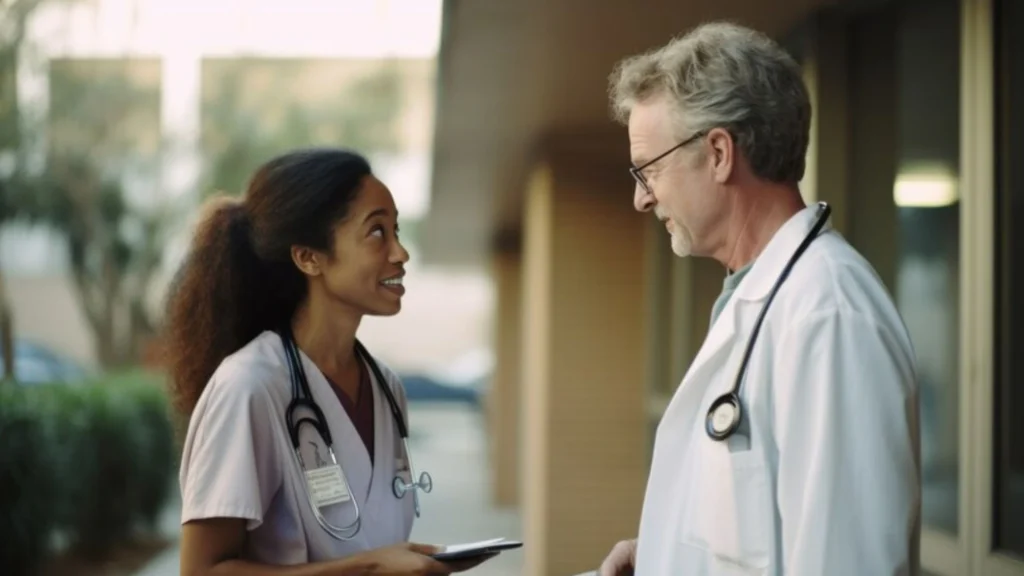Junior doctors are typically responsible for admitting patients to the hospital, taking their medical history, and performing a physical examination. They review their test results and vital signs to monitor a patient’s condition and adjust their treatment plan as necessary. Young doctors also prescribe medication and update patients’ medical records with their progress. They may consult with senior doctors and specialists to determine the best course of treatment for their patients.
To perform all these activities, they must have proper dress. In that case, cargo scrubs women’s are also very helpful during surgeries and procedures for junior doctors. Young doctors assist senior doctors during surgeries and procedures by preparing patients, monitoring their vital signs, and handing them surgical instruments. They may also perform minor procedures under the supervision of senior doctors.
The junior doctors are often the first point of contact for patients when admitted to the hospital. They are responsible for conducting a thorough medical examination, taking a detailed medical history, and ordering diagnostic tests to determine the cause of the patient’s symptoms. Their findings suggest that young doctors prescribe medication, recommend lifestyle changes, or refer patients to specialists for further evaluation. Major duties are as follows.
Patients Progress:
Junior doctors are also responsible for monitoring patients’ progress and adjusting their treatment plans as necessary. They review patients’ test results and vital signs and consult with senior doctors and specialists to determine the best course of action. If a patient’s condition deteriorates, young doctors must act quickly to stabilise the patient and prevent further complications to save lives.
Assisting Seniors During Surgeries:
During surgeries and procedures, junior doctors assist senior doctors by preparing patients for the procedure, monitoring their vital signs, and handing them surgical instruments. They may also perform minor procedures under the supervision of senior doctors. Young doctors are responsible for ensuring that patients are comfortable and well-informed throughout their hospital stay.

To answer patients’ questions about their condition or treatment plan, they must communicate clearly and effectively with them. Doctors play a very important role in the healthcare system. They provide initial medical care to patients in hospitals, clinics, and other healthcare settings. In this essay, we will explore the responsibilities and duties of the doctors in hospitals.
Admission and Assessment:
Junior doctors are often the first point of contact for patients when they are admitted to the hospital. They are responsible for conducting a thorough medical examination, taking a detailed medical history, and ordering diagnostic tests to determine the cause of the patient’s symptoms. Based on their findings, doctors may prescribe medication, recommend lifestyle changes, or refer patients to specialists for further evaluation.
These junior doctors must be able to think critically and make quick decisions when assessing patients. Patients’ symptoms must be identified, and a treatment plan must address the root cause of the problem. They must also be able to communicate effectively with patients and their families, explaining their diagnosis and treatment plan clearly and concisely.
Treatment and Management:
Junior doctors are responsible for monitoring patients’ progress and adjusting their treatment plans as necessary. They review patients’ test results and vital signs and consult with senior doctors and specialists to determine the best course of action. If a patient’s condition deteriorates, doctors must act quickly to stabilise the patient and prevent further complications.
Junior Doctors in the Emergency:
Junior doctors must be able to work well under pressure and make quick decisions in emergency situations. In order to provide the best care to patients, they need to be able to prioritise their tasks and manage their time effectively. They must also be able to work collaboratively with other healthcare professionals, including nurses, pharmacists, and therapists, to ensure that patients receive a holistic approach to care.
Prescribing Medication:
The junior doctors are responsible for prescribing medication to patients. They must have a thorough understanding of the pharmacology of different drugs and be able to select the appropriate medication for a patient’s condition. They must also be able to monitor patients for potential side effects and adjust their medication as necessary.
Junior doctors must be able to communicate effectively with patients about their medication. They must explain the purpose of the medication, how it works, and any potential side effects. They must also provide clear instructions on taking the medication and answer any questions patients may have.
Documentation and Record-Keeping:
Junior doctors are responsible for documenting their patients’ medical history, examination findings, and treatment plans. They must keep accurate and up-to-date records of their patient’s progress and ensure that their records are accessible to other healthcare professionals who may be involved in their care.
In conclusion, junior hospital doctors have diverse responsibilities, encompassing patient admission, assessment, treatment, and emergency care. They are crucial in monitoring patients, assisting in surgeries, prescribing medication, and maintaining accurate medical records. Young doctors are essential contributors to the health system, providing comprehensive care and ensuring patient well-being.
